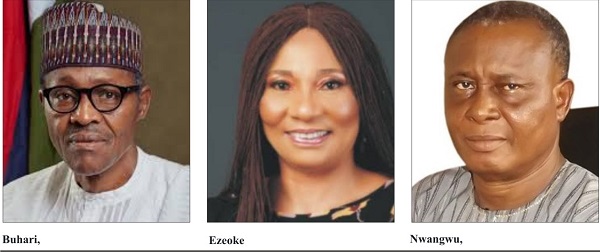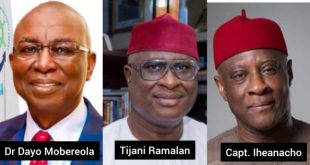By Kenneth Jukpor
The frugal disposition of Nigeria’s President Mohammadu Buhari has become a subject of debate following the calls for distinct ministries to address specific needs even as a new Ministry of Fisheries and Aquaculture has been proposed.
At a time when the nation grapples with paucity of funds amid unstable global crude oil prices and numerous fiscal challenges, economic diversification has been highlighted as a viable alternative and fishing epitomizes this opportunity.
Despite Nigeria’s abundant water resources, every year the nation imports fishes worth over $1billion, approximately N400billion, while fishing remains grossly untapped and marginalized.
Presently, Nigeria’s annual fish demand is placed at 3.5 million metric tonnes while annual production from all sources – aquaculture, artisinal and industrial – is an abysmal 1.1 million metric tonnes, thus making the country a net importer of fish in order to meet with the fish demand of the populace.
On Monday last week, a member of the House of Representatives, Mr Awaji-Inombek Abiante, called for a separate ministry to handle fisheries and aquaculture in Nigeria due to the huge potential for the economy.
Abiante, the Fisheries Society of Nigeria (FISON), and other stakeholders in the agriculture sector have decried the abysmal state of the nation’s fishing business which has been relegated to local small scale fishing.
The goal is for fishing to regain its former position as one of the top revenue earners for the country, but to achieve this Nigeria needs to implement transformational changes in fishery management and governance to create an environment that supports sustainable fishing to shore up annual fishery production in the country.
This is just as FISON installed various governors, former governors, members of the National Assembly and traditional rulers as its fellows.
The investiture took place in Abuja on Saturday at the 16th Fellowship Investitures and Launching of N500million Building Fund for the National Secretariat.
The new FISON fellows are Governor of Ekiti State and Chairman, Nigerian Governors’ Forum, Kayode Fayemi; Governor of Plateau State and Chairman, Northern Governors’ Forum, Simon Lalong, and Governor of Bauchi State, Senator Bala Mohammed.
Members of the Senate include former Governor of Nasarawa State, Senator Abdullahi Adamu; former Governor of Ogun State, Senator Ibikunle Amosun; Deputy Chief Whip, Senator Aliyu Sabi-Abdullahi; and Senator Muhammad Enagi.
Honoured in the House of Representatives were the Chief Whip of the House, Mohammed Monguno; Awaji-Inombek Abiante and Abdullahi Garba.
Also on the list were the Chief of Army Staff, Lt-Gen Tukur Buratai; Senior Special Assistant to the President on Niger Delta Affairs, Senator Ita Enang; and Emir of Borgu, Niger State, Dr Muhammed Dantoro, among others.
Meanwhile, speaking with MMS Plus on the possibility of having a distinct Ministry of Fisheries, an investor in fishing and Chief Executive Officer (CEO) Lexzy Peters Nigeria Limited, Chief ), Mr. Lexzy Nwangwu described the move as a misplaced priority.
His words: “Nigeria’s problem with fishing isn’t more ministries. In fact, creating more ministries can be likened to creating more load for the government. The nation doesn’t have the finances to run additional ministries. Setting up a new Ministry would entail getting more infrastructural assets, increase cost of governance as more directors, members of staff including experts that could command colossal sums as earnings. What would this Ministry of Fisheries seek to address, that the current Department of Fisheries cannot handle?”
Sharing his experience in operating a fishing vessel which has gone aground, he said; “If you have a fishing vessel, fisheries department is supposed to inspect and approve all the fishing tools. There are approved sizes of nets to be used. The department sends out officials to inspect and they visited my office severally. When I was buying my nets, they weren’t the same size. I was advised to do so in order to have the lower part of the smaller to catch all sizes of fishes. The lower part of the net is where the fishes stay have been reduced so they don’t escaped. This is just an example of the kind of service delivery and rigmarole in the Department of Fisheries.”
“When you go for fishing outside bar, you find the regulatory agencies including the Fisheries Department, Customs, among others. The idea is to inspect the fishes and vessels but they are more interested the fishes and monies that they collect. People say this behaviour of poverty or hardships but the truth is that the problem is greed. There are lots of resources in Nigeria but no structure to manage and harness the huge resources.”
Abiante had also stressed that there was a huge gap in Nigeria’s fish requirement.
“The records are there; science is tending to encourage us to do more of fish than red meat. There is Omega3 requirement for several categories of persons, and you find it in fish.”
“The value chain addition that we will have, we are losing it out. The total global value of the fishing industry is over $200billion and with the kind of environment we have, we can get as much as 5 to 10 percent. The 10 percent of that value will give us something even greater than what we make in the oil and gas sector.”
“When you are talking about policy direction, in China they have a separate ministry for aquaculture and fisheries. In Morocco, they have defined drivers of this. In Japan, it is the same thing. Denmark also. So, we are saying that it is high time Nigerian Government considered the creation of a separate ministry for fisheries, aquaculture and ocean resources. We should have that established to drive the policy and enable us to get the benefits from what we are doing,” he said.
Meanwhile, the President of Women’s International Shipping Trading Association (WISTA) Nigeria, Mrs. Eunice Ezeoke described the fishing sector as part of the nation’s economy that wan’t properly regulated and monitored by the government.
Her words: “Women in riverine areas are mostly into fishing and this business is not at the industrial level. Our waters are not properly managed and as a result you discover that foreign fishers invade our waters to do fishing and they fish without any kind of barriers, depleting the nation’s fishes and other aquatic species. They also fish in some areas where they ought not to.”
Noting that women participating in fishing lack the capacity to fish at large scale level, she encouraged the government to focus on developing capacities of residents in coastal areas to enable them take on fishing at an industrial level.
“There are fishing vessels that are equipped to go far into the high seas and that is where there is provision for high level catch with good commercial quantity that can be exported. God has blessed this country. Nigeria is a coastal nation surrounded by water and there is high population of fishing in our waters but the people, especially women, lack the financial strength to exploit the riches contained in these oceans and waters,” she said.
Nigeria, despite being in the midst of abundant aquatic resources that include a coastline of 853 kilometres, abundant swamps and wetlands as well as numerous lakes and rivers, depends on fish importation to meet its needs.
The Nigerian Fisheries Report 2016 estimated our fish demand at 3.32 million metric tonnes but domestic production was placed at 1.12 million metric tonnes, leaving a deficit of 2.2 million metric tonnes.
 MMS PLUS NG – Maritime, Aviation, Business, Oil and Gas News Online Newspaper with coverage in Maritime, Oil and Gas, Aviation, Power and Energy as well as Financial News
MMS PLUS NG – Maritime, Aviation, Business, Oil and Gas News Online Newspaper with coverage in Maritime, Oil and Gas, Aviation, Power and Energy as well as Financial News










